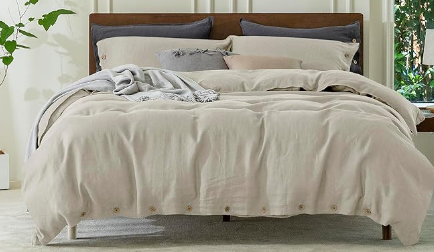Sustainable duvet covers are becoming increasingly popular as more people seek environmentally conscious alternatives to traditional bedding. A duvet cover is not just a decorative element; it plays a crucial role in maintaining your duvet’s cleanliness and providing comfort during sleep. When made from sustainable materials, duvet covers help reduce your environmental footprint while offering a cozy and luxurious sleep experience. This article delves into the importance of choosing a sustainable duvet cover, the benefits they offer, and how to select one that suits your needs and style.
Why Choose Sustainable Duvet Covers?
Choosing a sustainable duvet cover not only supports eco-friendly practices but also offers a range of practical and comfort benefits. Here’s why sustainable duvet covers should be part of your bedding essentials:
Eco-Friendly Materials:
- Sustainable duvet covers are typically made from natural, renewable materials such as organic cotton, hemp, linen, or bamboo. These materials are grown without harmful pesticides, chemicals, or synthetic fertilizers, which helps preserve soil quality and reduces water waste.
- Organic cotton, one of the most common sustainable bedding fabrics, is grown without the use of harmful chemicals, making it safer for the environment and the farmers involved in its production.
- Some sustainable duvet covers are also made from recycled polyester, a fabric created from post-consumer plastic bottles, contributing to reducing plastic waste in landfills.
Durable and Long-Lasting:
- Sustainable duvet covers are often crafted with care and attention to quality, which means they are durable and designed to last longer than conventional duvet covers made from synthetic materials.
- Many eco-friendly duvet covers are woven with high-quality threads that improve with age, becoming softer with every wash, without compromising their strength.
- Investing in a well-made sustainable duvet cover can save you money in the long run, as you won’t need to replace it as frequently as cheaper, less durable options.
Reduced Chemical Exposure:
- Traditional duvet covers made from synthetic materials can often contain chemicals such as formaldehyde, flame retardants, and synthetic dyes. These chemicals may release toxic fumes or irritate sensitive skin.
- Sustainable duvet covers made from organic fabrics are free from these harmful chemicals, making them a safer choice for individuals with allergies, asthma, or sensitive skin.
- The use of natural dyes in eco-friendly duvet covers ensures that your bedding is not only safe but also contributes less to environmental pollution.
Breathability and Comfort:
- Sustainable fabrics like organic cotton, linen, and bamboo are highly breathable, allowing for better air circulation and moisture-wicking. This helps regulate your body temperature and prevents overheating, ensuring a comfortable night’s sleep.
- Organic cotton duvet covers, for example, are known for their soft, breathable texture that promotes airflow and can keep you cool in the summer and warm in the winter, making them ideal for year-round use.
- Linen, another popular eco-friendly material, is known for its natural texture that becomes softer with each wash, while providing excellent temperature-regulating properties.
Aesthetic Appeal:
- Sustainable duvet covers come in a wide range of styles, colors, and designs, making them suitable for various bedroom aesthetics. Whether you prefer minimalist, bohemian, or luxurious decor, there’s an eco-friendly duvet cover to match your style.
- Many sustainable duvet covers feature timeless, classic designs that won’t go out of fashion, offering long-lasting appeal and versatility.
- Their natural, unprocessed fabrics often have a beautiful texture and subtle sheen, which can instantly elevate the look of your bedroom while adding a cozy, inviting atmosphere.
How to Choose the Best Sustainable Duvet Cover
When selecting a sustainable duvet cover, there are several factors to consider to ensure you choose one that fits your needs, budget, and aesthetic preferences:
Fabric Type:
- Organic Cotton: Known for its softness and durability, organic cotton is one of the most popular sustainable bedding materials. It’s breathable, hypoallergenic, and gentle on the skin.
- Linen: Linen duvet covers are highly breathable and moisture-wicking, making them ideal for warm climates or hot sleepers. Linen has a textured finish that adds a rustic charm to any bedroom.
- Hemp: Hemp is an eco-friendly fabric that is naturally resistant to mold and mildew. It’s durable, lightweight, and requires minimal water to grow, making it an excellent choice for a sustainable duvet cover.
- Bamboo: Bamboo is another popular choice for sustainable duvet covers. It’s naturally antibacterial, moisture-wicking, and incredibly soft. Bamboo also has a silky smooth texture, making it a luxurious choice for those who want eco-friendly comfort.
Certifications to Look For:
- When shopping for sustainable duvet covers, it’s important to look for certifications that guarantee the product is truly eco-friendly. Some of the most common certifications include:
- GOTS (Global Organic Textile Standard): This certification ensures that the duvet cover is made from organic fibers and produced using environmentally and socially responsible methods.
- OEKO-TEX Standard 100: This certification verifies that the duvet cover has been tested for harmful chemicals and is safe for human use.
- Fair Trade Certified: This label ensures that the duvet cover has been produced under fair labor conditions, supporting workers in developing countries with fair wages and safe working environments.
Thread Count and Weave:
- Thread count refers to the number of threads woven into a square inch of fabric. While higher thread counts are often associated with softness, sustainable fabrics like organic cotton or linen tend to be softer regardless of thread count.
- Sateen Weave: This weave is smooth and silky, often found in eco-friendly cotton duvet covers. It provides a luxurious feel while maintaining breathability.
- Percale Weave: This weave offers a crisp, cool feel and is often used for organic cotton bedding. It’s perfect for warmer climates and those who prefer a fresh, clean feel to their bedding.
Size and Fit:
- Ensure that the duvet cover you choose fits your duvet properly. Duvet covers typically come in sizes ranging from twin to king. Check your duvet’s dimensions to avoid getting a cover that’s too tight or too loose.
- Look for duvet covers with button closures or zippers to keep the duvet securely inside. Some duvet covers also feature corner ties that help prevent shifting or bunching inside the cover.
Benefits for Your Sleep and Health
Sustainable duvet covers do more than just help the environment—they contribute to your overall health and well-being. Here’s how:
Improved Sleep Quality:
- The breathability and moisture-wicking properties of natural materials like organic cotton and bamboo help regulate body temperature, preventing night sweats and discomfort during sleep.
- The hypoallergenic nature of sustainable duvet covers makes them ideal for people with allergies or sensitive skin, as they reduce exposure to harmful chemicals and irritants found in conventional bedding.
Better for Sensitive Skin:
- Because sustainable duvet covers are free from harmful chemicals and dyes, they are gentler on your skin, reducing the likelihood of irritation or allergic reactions.
- Fabrics like organic cotton are naturally soft, providing a smooth surface that won’t cause friction or discomfort during the night.
Reduced Carbon Footprint:
- By choosing sustainable duvet covers made from eco-friendly materials, you are supporting a reduction in environmental harm. These products are produced with a lower carbon footprint, as they use fewer resources and less water compared to traditional bedding made from synthetic fibers.
How to Care for Your Sustainable Duvet Cover
To ensure your sustainable duvet cover remains in excellent condition for years, proper care is essential:
Follow the Care Instructions:
- Always check the care label for specific instructions on how to wash and care for your duvet cover. Many sustainable duvet covers can be machine-washed in cool water and tumble dried on low heat.
- If possible, air-dry your duvet cover to minimize shrinkage and preserve the fabric’s integrity.
Wash with Gentle Detergents:
- Use eco-friendly, gentle detergents that are free from harsh chemicals. This will help maintain the quality of the fabric and prevent the release of toxins into the environment.
Avoid Fabric Softener:
- Avoid using fabric softeners, as they can leave residues on the fabric that may reduce its breathability and moisture-wicking properties.
Where to Buy Sustainable Duvet Covers
Many brands offer high-quality sustainable duvet covers, including:
Boll & Branch:
- Known for their organic cotton bedding, Boll & Branch offers sustainably made duvet covers that are both luxurious and eco-friendly.
Avocado Green:
- Avocado Green is renowned for its commitment to sustainable practices and offers a wide range of organic and natural bedding options, including duvet covers made from organic cotton and linen.
Coyuchi:
- Coyuchi offers a range of eco-friendly duvet covers made from organic cotton, linen, and wool. They are known for their beautiful, sustainable designs.
Price Range: Sustainable duvet covers typically range from $80 to $250, depending on the material, brand, and size.
Conclusion
Sustainable duvet covers are a great way to incorporate eco-friendly practices into your home without compromising on comfort, style, or quality. With materials like organic cotton, linen, and bamboo, these duvet covers provide a healthy, breathable sleep environment while reducing your environmental impact. Whether you’re motivated by environmental concerns, health reasons, or simply the desire for high-quality bedding, a sustainable duvet cover is a smart investment for both your home and the planet.




